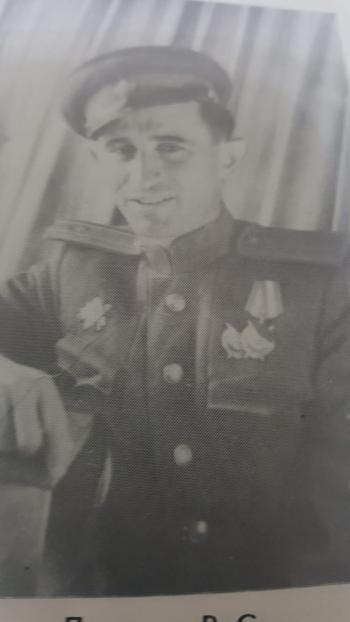Rafail Poleshchuk (Polishchuk) was born in the town of Staro-Konstantinov in Ukraine in 1917. His father worked as a tanner, and the family had two sons and three daughters. In 1924, Rafail began to attend a seven-year Yiddish school, and finished it in 1931. In the late 1920s, the town had an active Zionist cell. Rafail participated in its meetings in the forest, where Zionist songs were sung, and Jewish youths congregated at the Polishchuk family home, because Rafail's elder sister and her husband were ardent Zionists. The sister's husband would eventually be arrested; after his release, he would be able to immigrate to Palestine.
In 1932, Rafail moved to Leningrad and enrolled in a factory school. During his studies, he lived with his elder sister, who had moved to the city earlier. In 1937, he was drafted into the Red Army and sent to the Leningrad Infantry School, which he completed in 1939. He went on to take part in the Soviet-Finnish (Winter) War, and later served in Transcaucasia as a platoon commander. When the Soviet-German War broke out in June 1941, Rafail was in Baku. He immediately requested to be sent to the front.
Shortly thereafter, he was transferred to Tbilisi, where a paratrooper reconnaissance special battalion was being formed, and he would serve in that unit until 1943, eventually rising to the position of company commander. In November 1941, after several months of training, Rafail and his comrades were deployed to the frontlines in the city of Krasnodar. The battalion was attached to the front headquarters, conducting reconnaissance missions in the German rear. Groups of scouts were sent to various parts of the Crimean Peninsula to carry out special tasks, ranging from intelligence gathering to sabotage.
By the spring of 1942, Rafail had been promoted to captain. During this time, he participated in heavy combat in the Crimea, and was awarded the Order of the Red Banner for his actions. He was then moved to the North Caucasus, and later landed in Novorossiysk (Malaya Zemlya). In the summer of 1943, he was sent to study at the Higher Reconnaissance School of the General Staff. Initially, he was assigned to the Agent Intelligence Department, but later transferred to Military Intelligence, since the former job was too risky for a Jew. He adopted the alias "Mikhail Konstantinov". In late 1943, Rafail was appointed head of the intelligence department of the 19th Airborne Brigade, which was fighting near Moscow. In 1944, the brigade was deployed to the Karelian Front, and then to Poland and Hungary. Rafail, who had risen to the rank of major by that time, took part in the fierce battle for Budapest, along with the rest of the brigade. Toward the end of the war, he was promoted to lieutenant colonel. He met V-E Day in Czechoslovakia.
On his way across Europe, Rafail encountered many liberated inmates of Nazi camps, especially in Hungary. While fighting in Austria, his division participated in the liberation of miners from a labor camp, many of whom were Jews.
In the course of the war, Rafail Poleshchuk was decorated with two Orders of the Red Banner and the Order of the Patriotic War, 1st class. He went on to serve in the army until 1956, first in Hungary, and then in the Soviet Far East. He also worked as a military advisor to the Chinese Army in Manchuria. After his discharge, Rafail, who already had a wife and two children, decided to move to Moscow. Although his sister and her family already lived there, as did his wife's parents, he initially struggled to secure an apartment and a residency permit in the city, so he rented a dwelling nearby. He worked as a parachute instructor in the Volunteer Society for Cooperation with the Army, Air Force, and Navy. In 1959, Rafail re-enlisted in the army to attend the Higher Intelligence Courses, where he earned the rank of colonel upon graduation. In the early 1960s, his family was allocated two rooms in a communal apartment in Moscow.
Afterward, he worked as the principal of a technical school in the Soviet capital, while also studying at the Polytechnic Institute. He eventually became the director of the Center of Science Education at the Ministry of Consumer Services, holding this post until 1978.
In 1981, Rafail Poleshchuk and his family immigrated to Israel.







